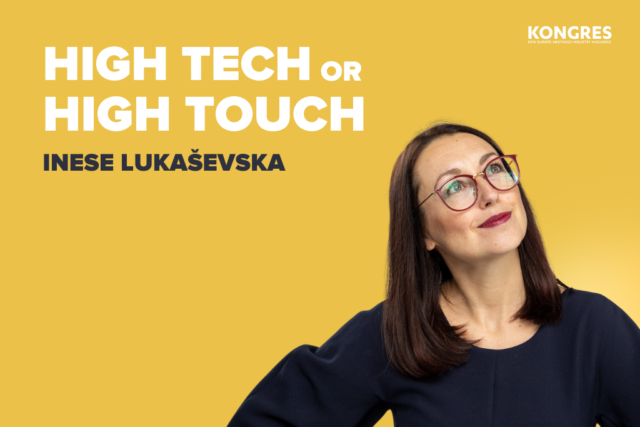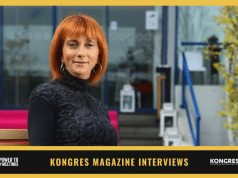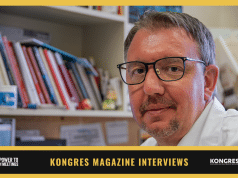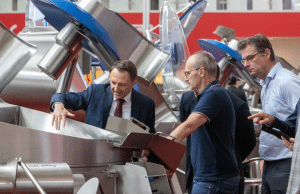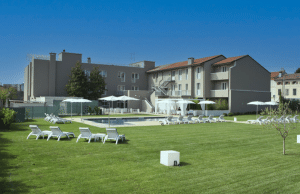“The organiser’s desire to win will have to be stronger than their fear to lose”
Q: What do you desire the most at the moment?
At the moment, I really miss “things”, values, and opportunities which were absolutely self-evident only a year ago. For instance, to breathe freely to the fullest, really feel the stream of air touching every vertebra of your spine, to be able to hug people and give them genuine emotions, definitely not jumping back from passers-by as they were a potential hazard. I wish the meetings in person were not an extra, but self-evident value, especially in this age of over-digitalisation, when people see communication through the social networks as a priority over the meetings in person, looking into eyes and showing a genuine interest. I also miss people listening to you, not for the sake of reply but to really understand you. And even if it sometimes feels like the world has gone insane, I would like every one of us to remember that the most important thing is to stay sane in our personal little worlds. Certainly, I miss the process of creation as well, where we think about art first and foremost.
Q: Why do you love organising events?
I am delighted by the process of creation in event organising, where the process is often many times more interesting than the result itself. The torture of creation, the applying of final touches to the ideas, the critical view on the concept as a whole, or the integration of different details and their purpose causes genuine addiction. Plus, I love to challenge myself and make the audience think outside the borders of regularity by merging different genres, forms of art, and even science. I love to take down the walls between art and technology, physical and human sciences.
I am a perfectionist by nature, looking critically at all the ideas created, insistently trying to answer the question “so what?” Or what will change if we add one or another activity. How meaningful will it be and what function will it perform? Unfortunately, in many events, we see that there are different components and instruments integrated which live their own lives and do not enrich the idea. In my opinion, every detail, design element, performer or character has to do their particular role that enhances and brightens the general concept by weaving the story through every second. It is because the story will always prevail over the facts. And I also cannot leave unstressed the relevance of innovations and creative outlook. It is because of the creativeness and non-standard look that we can encourage not only the development of new ideas, cause discussion about the meaning and value of art but also discover, and make the viewers show their genuine emotions, which to my mind is the only currency that matters.
Moreover, there is another thing to be understood in the context of creativeness. Creativeness and generation of new ideas and daring to realise them is the only way ahead because it is not possible to just maintain the state of things – it applies not only to the personal development of each individual but also to the corporate level. Creativeness is also an opportunity, as well as the freedom of choice. The exploration of many ideas helps to stimulate the imagination, but imagination is the crucial factor of creativeness. What is a person without imagination, after all? Another question is about the fear of failure and fear to dare at the individual and corporate level, blocking the creativeness which we all should actually wish for since failure is the only way to success.

Q: Can you present the tool or app you use the most during the corona crisis?
Microsoft Teams and Zoom.
Q: How would you explain to a client why organising events is essential?
First, I have to say that organising events cannot be the cure. We have to understand the message we want to express with the event and more importantly, what is its goal. At the same time, we need to showcase in what way we measure the acquired results (ROI). Secondly, we have to perform a strategically objective analysis of whether the event is the right set of instruments to achieve a particular aim. I have to point out here that I am usually against corporate events, because, in my opinion, the event should be organised in a way of a really special occasion that can make changes not only in the eyes of society, in its attitude towards it, in being properly informed about it, but sometimes also at the level of social policy. And I always highlight that even corporate events can be and should be created in a form of high-quality art.
It is essential to persuade the client to look at the event as a vital tool of live communication, a unique instrument that provides nearly unlimited options in delivering the message. It is possible to reach the corporate goals of the company or organisation because of the successfully organised event, in this way increasing of the client and employee loyalty towards the company, its brand and management, promoting the visibility of the products and services, the reputation of the brand and image, as well as creating the feeling of emotional affiliation, which is vital according to the study that exactly the emotional bond with a brand is much stronger propulsive to choose a product of a particular brand than its practical benefit.
In the context of culture and art events, however, it is definitely worth to talk about values, purpose, esthetics given to us by art, music, traditions, cultural and historical legacy, that exceeds bare borders of human rationality and material existence, providing us with a chance to step across yet another border of widely criticised consumer society so typical these days. We should also understand that the aim of culture is not to entertain and make everyone happy, but to guide people towards the society that thinks and is able to analyse itself. If there is no culture, there is also no nation, no identity, no country since there is simply no future for the country without the culture.
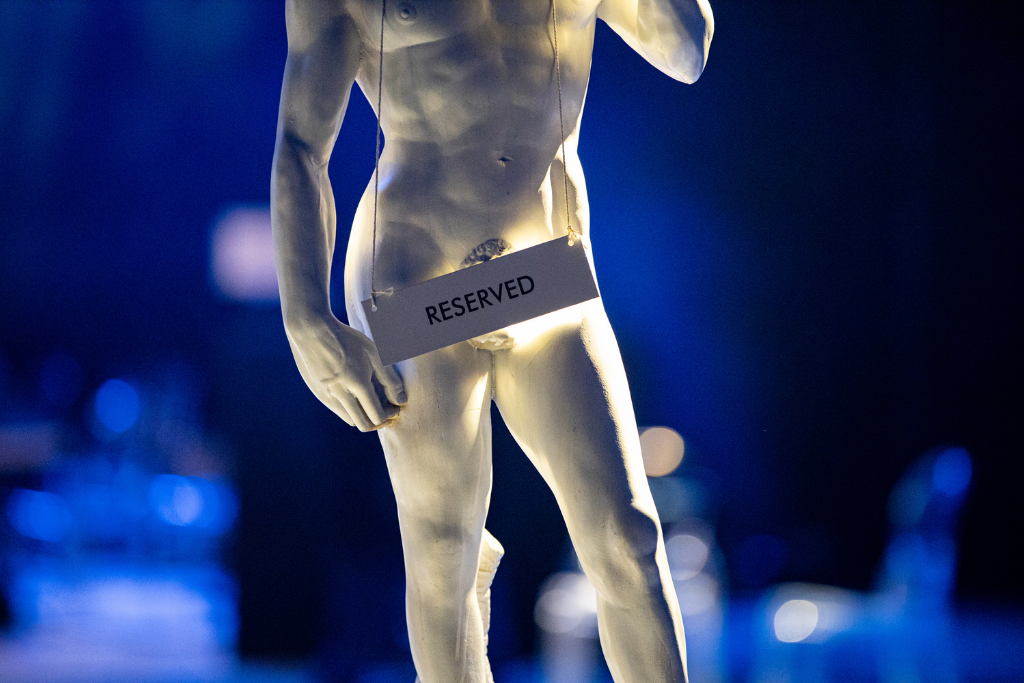
Q: Is it easier to organise digital or live events?
Every event format whether it is digital or a “live event”, has its own specific character, structure and complexity. So according to that, I definitely cannot claim that it is easier to organise one event over the other. Everything depends on the event concept, idea, the scale of the action and “transmission”, the applicability of extraordinary and risky solutions, size, ambitions, the number of involved participants and countries and other aspects. It is like the eternal question – how much does it cost to organise an event? It all depends on desires, ideas and the result you want to achieve. The matter of budget is also essential, or as I like to say: you can make the president of the USA jump out of a helicopter naked with a flag of the event organising country in his hand, it is just the question of whether we can afford it. And, of course, whether we really need it.
Q: Is organising digital events cheaper than organising classic events?
Definitely not. It is a myth that we can save money on premises rental, possibly reduce the cost of lecturers, transportation and other costs. Digital solutions, technologies, especially, in cases with the involvement of several event venues and co-organising countries, etc. A different and important question, however, is about the level of apprehension because many still believe that a digital event is something cheap but again it depends on what you wish and on the quality of the event. To my mind, no self-respecting event organiser can afford to connect the participants on Zoom platform (e.g.) and forget about the esthetics of the screen, the content, idea, weaving of the concept, scenography and all the other aspects of a high-quality event.
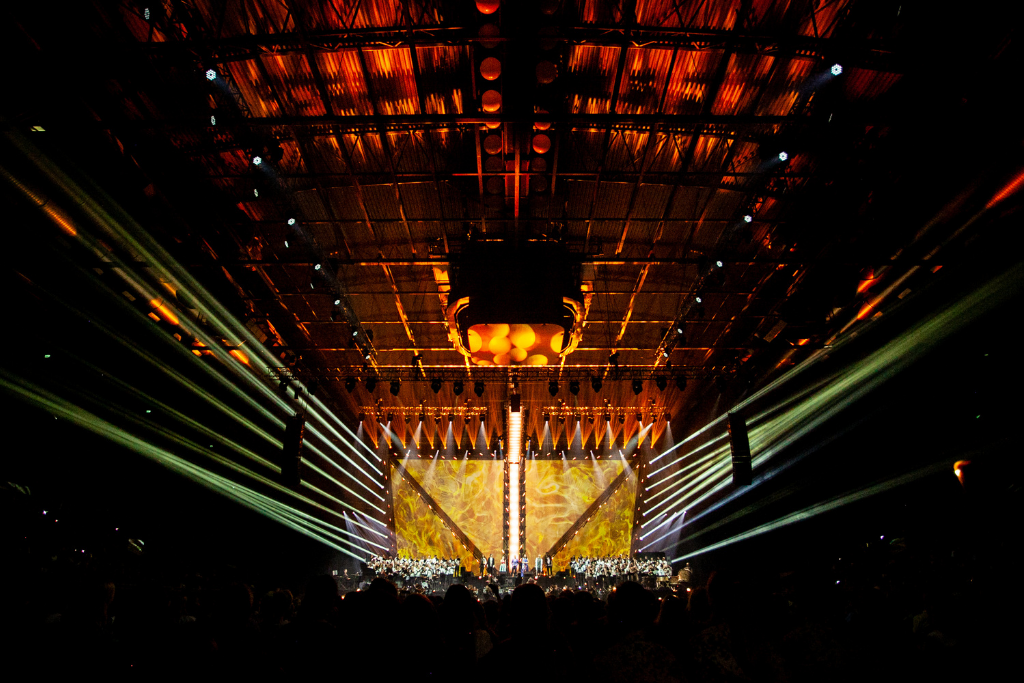
“the audience is a live organism, and often very difficult to predict”
Q: If the future of the meetings industry will be green, where do we start?
Although many event organisers are trying to adapt and to customize events for the online format, I agree with the belief that we can call an event an event only in case it takes place in real-time and place. Everything else is just an online translation, or to be even more direct – to organise a show online is the same as to have sex on the Internet. But it is important to understand what kind of events we are talking about, because conferences, seminars and similar events are adaptable, easier to customize for an online format whereas with corporate entertainment, art and culture events it is nearly impossible.
Of course, we offer different online solutions as well, there are several multimedia options we have created to help “revive the stage”, make it live, mobile and interactive. Different team-building events are also created online. But just as the spectator needs to feel the artist’s emotions and energy vibrations, the artist has to feel this live energy from the audience. The one that the artist puts into the performance, concentrates and is ready to pass it on to the viewer. Unfortunately, no digital event can do that.
The income from the tickets sold in advance is essential for event organisers since they have to forecast their income, find the assets for investments necessary to produce an event, etc. There are only a few companies in the market with large financial assets available to invest in an event at their own risk. This is what the event organisers have to think about, and they have to do it right now – how to regain the trust of the viewers?
The second aspect that has to be considered is the speed of habit change. A human being is conservative by nature, and it has difficulty to change the habits that have been an integral part of everyday life for a while. For example, if high-quality virtual events have been experienced before, society could continue to consume them, by demanding this format. According to that, the content offered by event organisers will have to be more attractive and of higher value than before Covid–19, especially because people will make a different choice.
During the lockdown, people had the chance to stop and think about the things they do and things they want. This also includes the way people used to travel which goes hand in hand with attending different kinds of events – concerts, festivals, exhibitions, conferences and so on. Event organisers will also be challenged to disperse different emotional characteristics that are popular in society, for example, fear of stepping outside the comfort of their homes, fear of attending public events with a high concentration of event attendees, even if it is said to be relatively safe and the organiser will have taken care of all security matters.
And finally, the organisers will have to focus more on the content of the event and the ability to create an attractive experience without being afraid to take the risk. It applies to concepts as well as to the realisation of projects in general. In other words, the organiser’s desire to win will have to be stronger than their fear to lose.
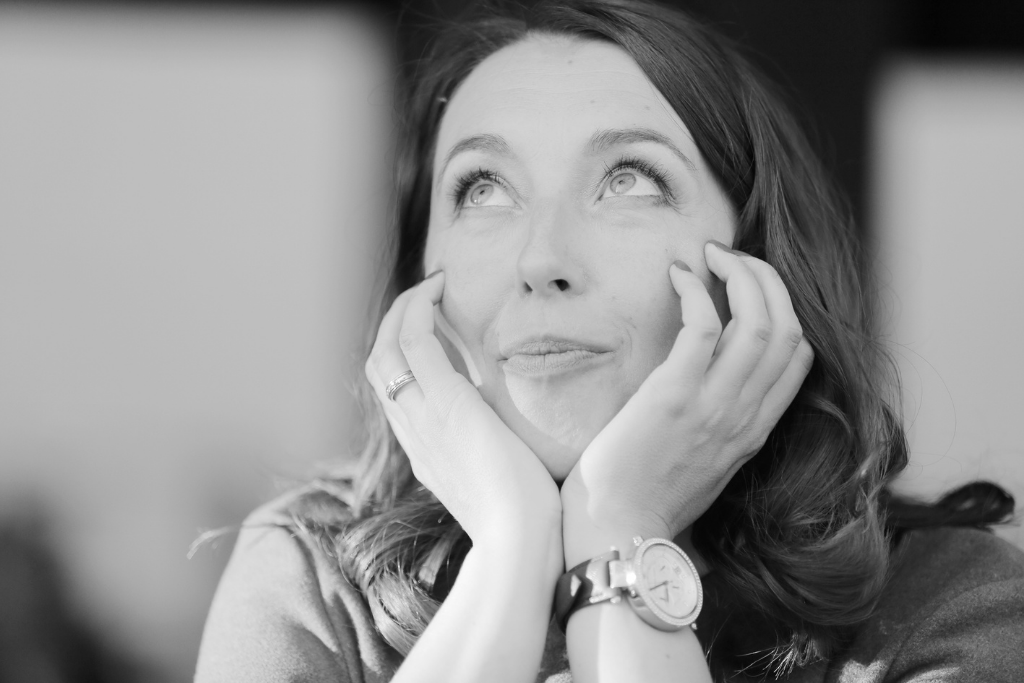
Q: What will be the key trait of a great event organiser after the corona crisis?
Most likely someone who will have taken the advantage of this Covid-19 period to change, grow and acquire new knowledge and to implement it in practice. Someone who is flexible, goal-oriented with a focus on sustainability, who puts the content and provides an attractive experience over the form. Someone who sees the difference between the ideas of hybrid and digital events and the objective to be achieved and live event and does not believe that one concept can be brutally transferred from one to any other format. They will also have to be able to see things in a broader spectrum, in projects with different industries combined, not only the event industry alone. By doing so the organiser will make a practical and economic contribution to many industries.
Finally, an outstanding event organiser will have to be able to create the event as a very special occasion, that will not only cause catharsis in the audience but will also leave a long-lasting imprint in its attitude and behaviour and with joint effort make the world a better place.
Q: What is your view of the future? Where is the meetings industry headed?
A human is a social being. Accordingly, virtual or hybrid events will never fully substitute live events. A human being will always have the desire to meet, hug, shake hands and build a dialogue in person. The period of Covid-19 proved that definite fields, especially, when combined with a live event format, virtual events can give much greater outcomes and better results than in cases with one format consumed.
Hybrid events will become an integral part of everyday life
This format will allow extending the target audience, counting in the part that will not be able to travel, or those who find live events inconvenient, or not safe enough and so on. However, this doesn’t mean just transferring the activities of live events to digital formats but providing two different consumer experiences. There are different formats of digital events, platforms, 3D solutions, etc. The event organiser just will have to choose and apply the one that best suits the aim of the event.
Benefits of a live event will invariably remain a value
The interaction of being present builds trust and relationship. On the contrary, during virtual events, the attention of the consumers often have been distracted. They are distracted by work, e-mails, children staying at home or pets running around. Live events allow grasping the nuances, even non-verbal communication – the facial expressions, movements, gestures. International live events can ensure not only wider networking opportunities but also an integral experience that in turn creates memories. Memories that leave an indelible imprint in people’s minds and souls. Because it is enough to smell one particular scent, hear a sound or see a sight for this moment to remind people about people they met and memories gained. And I am not even talking about the emotional pleasure and exchange of energy.
Safety, flexibility and sustainability
Even after the pandemic is over, if that actually is the case, the social distancing, hygiene measures and safety will become a component of everyday life for the event organisers. Moreover, safety will have to be considered in the context of sustainability. Safety and sustainability do not have to exclude one another. But to make it happen readiness and comprehension from all aspects of the event planning will be necessary.
The moment when all the restrictions are cancelled, the economic pressure of countries and the wish to re-establish the economy may cause the precedent that we return to traditional economic growth and focus on the profit, not on people and the planet.
On the one hand, it is understandable, but on the other hand, it is not in our interest because we will lose the chance to divert sustainability as the point of focus in our industry. For instance, we all discovered our love for nature during the period of Covid-19. The important matter we should think about is how we can use these discovered feelings and advantages given to us by nature, in planning events, even in concept creation, without harming it, but taking care of it and highlighting the natural benefits given to us. Thanks to different initiatives, the event industry has the widest range of possibilities to be heard, by giving it its voice and including its vision even in ANO sustainable development goals.
More intimate, private events and their forms
Due to the restrictions set all over the world, people started to appreciate the more intimate form of events during the pandemic, where the content, form, even the environment is personalised to the viewers’ taste, or even synchronised with the wishes of individuals. In the future, an event format like this (small-sized concerts, hikes, personalised dinner in extraordinary places, etc.) will be consumed more. The only question is about the costs of such events and will it be possible to cover the budget with the income.
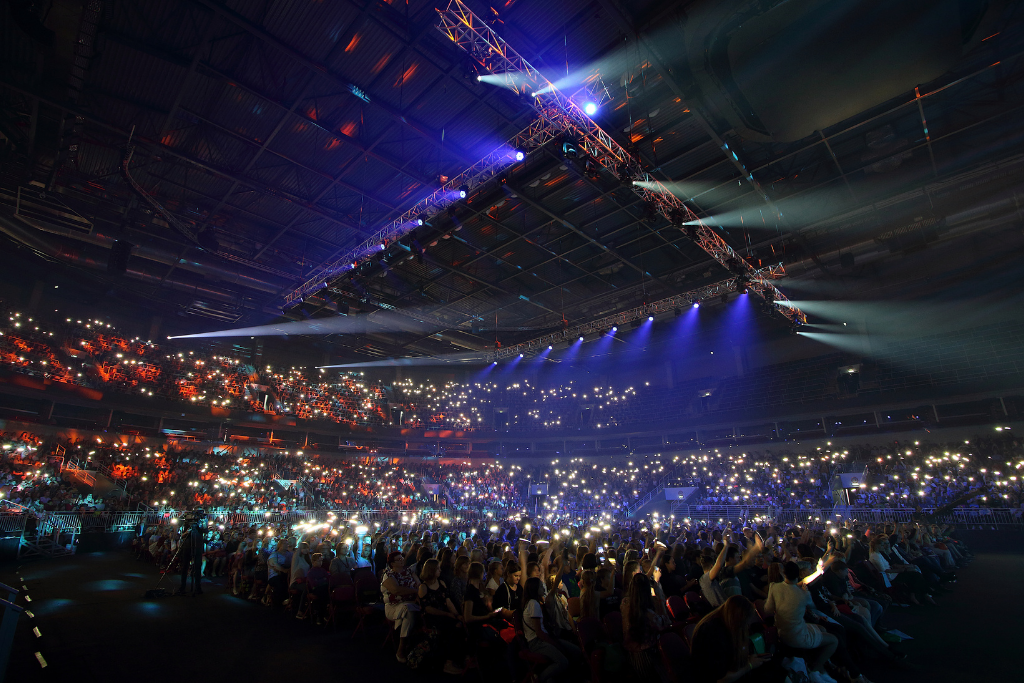
Q: What is the most surprising fact about organising events?
We can never be sure about the way the audience or spectators will react. It does not matter how hard you try to forecast it, the audience is a live organism, and therefore it is often very difficult to predict. It is also the beauty and misery of creating new things. Secondly, when creating unconventional, innovative and “out of the box” solutions, we can never guarantee 100% result even if these solutions have been tested many times before.
You have to calculate any risks and then the director or even more often the producer makes the decision whether it is worth to take the risk because it is important to understand the consequences of that risk. Often these consequences can mean not only the misunderstanding from the audience point of view or failure of the event or even a material loss but also a person’s life. I have had an event, for example, where people fly 50 meters above the ground. If something goes wrong with the safety construction systems, the outcome might be lethal. Or, there had been a case when my decision would have affected many thousands of people when in the worst-case scenario an evacuation would start with all the related consequences.
Of course, the producer has to calculate not only the consequences of the risk but also whether the particular artistic idea is worth realising it and whether the general idea will suffer in case of dismissal. It depends not only on the producer’s bravery, even insanity, or as I usually call it “the guts”, but also on how much he trusts his team, his or her technical staff, which build stage and safety systems and so on. As the practice shows, often the decision not to take the risk is made because no one is ready to give up the carrier, health and reputation for the sake of the artistic idea. Probably, I am some sort of an exception, because I have placed my 20-year carrier on the table for a 3-minute solution. When I look back, I still believe it was worth it.
EXTRA QUESTION FOR INESE
Q: High Tech or High Touch?
High Touch, of course?.


